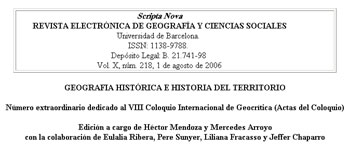When the factory create the city district: capital strategies and production of the metropolitan space in Rio de Janeiro
Keywords:
Industry capital, urban space, factory territoryAbstract
This essay deals wit industry and its relationship with urban space. It aims at follwed by afraction of the industrial capital in Rio de Janeiro. The object of our research is the Companhia Progrsso Industrial do Brasil (CPIB), a textile industry established in 1889, and more popularly known as Fábrica Bangu. By means of an analysis of the territorial strategies followed by CPIB, it was possible to identify three spatial-temporal phases. The first one is the “Farm-Factory” phase, and relates to the very establishiment of a factory that still has several links with the rural sector. The second phase can be regarded as the “Company-town” phase, urban improvements start to be provided and production experiences its first great expansion, especially in the years preceding Wold War I. Finally, the third and last phase is characterized by the adoption of a estrategy that stresses the sale of the territorial domains obtained earlier, thus transforming the CPIB in factory not so much uncommon than the others in the city. This is what we have called the “Urban Factory” phase. The advent of each one of these territorial strategies is closely related to corresponding stages of capital accumulation that combine the special conditions governing capital accumulation at the level of the firm with the general conditions guiding the development of capitalism in the Brasilian social formation.Downloads
Published
2007-05-03
Issue
Section
Articles
License
Los autores que publican en esta revista están de acuerdo con los siguientes términos:
- Los autores conservan los derechos de autoría y otorgan a la revista el derecho de primera publicación, cin la obra disponible simultáneamente bajo una Licéncia de Atribución Compartir igual de Creative Commons que permite compartir la obra con terceros, siempre que estos reconozcan la autoría y la publicación inicial en esta revista.
- Los autores son libres de realizar acuerdos contractuales adicionales independientes para la distribución no exclusiva de la versió de la obra publicada en la revista (com por ejemplo la publicación en un repositorio institucional o en un libro), siempre que se reconozca la publicación inicial en esta revista.





